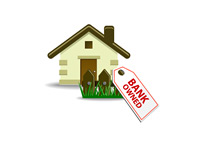The Ten Worst (Projected) Real Estate Markets in the United States
 There is no such thing as a general "real estate market" - rather, there are hundreds, if not thousands, of smaller real estate markets that can perform completely independently of each other. Sure, many of these smaller markets have taken a beating over the past few years, and you can certainly state that MOST of these smaller markets have been in a significant downtrend. However, some markets have actually managed to trend higher over the past couple of years (some, but not many), while certain other markets have taken a ferocious beating compared to the overall decline in home values.
There is no such thing as a general "real estate market" - rather, there are hundreds, if not thousands, of smaller real estate markets that can perform completely independently of each other. Sure, many of these smaller markets have taken a beating over the past few years, and you can certainly state that MOST of these smaller markets have been in a significant downtrend. However, some markets have actually managed to trend higher over the past couple of years (some, but not many), while certain other markets have taken a ferocious beating compared to the overall decline in home values. You've probably been hearing in the news about certain markets that have been absolutely savaged over the past year or so. California has really taken a drubbing, especially in the past calendar year - some markets within California have dropped as much as 30% from this time last year. The severity of the downturn is matched only by the decline in home values seen during the Great Depression - we have certainly never experienced a decline this harsh in our generation. Wealth is being evaporated at an alarming rate, and many people are choosing to just walk away and let banks foreclose on their homes. I read a stat recently that illustrated the mess that many Southern Californians now find themselves in - in the San Fernando Valley in January and February, there were 1,335 sales of condos and home, and 1,084 total foreclosures. Just an unbelievable stat.
So just where are the worst real estate markets right now, in the middle of 2008?
We obtained this information from a site called The Housing Predictor. They have compiled information from various industry forecasts to develop a list of the top 25 housing markets in the United States, based on the expected drop in home values in 2008.
It should come as no surprise that a full FIVE of the top ten worst markets are located in California. You have probably heard about the Las Vegas and Miami real estate markets being particularly hard hit as well - well they are on the list too, don't fret. Here is the top 10 list:
1. Ontario, Calfornia - Minus 24.5%
2. Las Vegas, Nevada - Minus 23.7%
3. Miami, Florida - Minus 22.1%
4. Detroit, Michigan - Minus 19.7%
5. Phoenix, Arizona - Minus 19.6%
6. Sacramento, California - Minus 19.1%
7. Los Angeles, California - Minus 18.5%
8. Anaheim, California - Minus 17.4%
9. San Diego, California - Minus 16.7%
10. Palm Beach, Florida - MInus 14.7%
All of these regions, which have already been decimated over the past couple of years, are due to receive haircuts in 2008.
These declines look pretty catastrophic (and they are, especially to someone who bought at the top of the market), but you also need to consider that many of these markets were hyper-inflated by speculators who obtained mortgages that they couldn't really afford in the first place. Many of these markets absolutely soared from 2002 to 2005 - now that the "easy money" has been taken out of the market (meaning, banks are much tighter in terms of who they will lend money to), the values are dropping just as fast. The market is being choked by excess supply and low demand. Many banks have an astronomical amount of foreclosed properties on their books which is increasing supply even more.
There are many buyers out there on the sidelines, but they are (smartly) waiting to put their money to work. There will be some UNBELIEVABLE deals out there for the savvy (and cash-rich) investor once this carnage has run its course, but many are really in no big rush to commit their capital. Many people that I have spoken with would much rather be a year late getting into the market after the rebound, rather than getting in a year or two early when the market could still post a double-digit decline. Because of this, you have a rapidly plunging real estate market in many areas as banks are getting what they can for their foreclosed properties, and no one is really willing to commit any capital to buy.
The hardest hit states (California, Michigan, Florida, Nevada and Arizona) have fallen due to an assortment of different reasons. In California, real estate spiked due to an overabundance of "easy money" and a desire for many Californians to continually upgrade their primary residences, even if they really couldn't afford it. Miami suffered from building out too fast (especially in the condominium market). Once the real estate market topped, buyers disappeared from these (sometimes unfinished) condominium projects. This excess supply crushed the market, and it still hasn't recovered. Michigan suffered from a weak auto business, Nevada was hit due to the rapid decline in the subprime lending market, and Arizona suffered after many people who chose to buy a secondary residence in the state were forced to sell due to a drop in the value of their primary residences.
The bad news is that these markets are getting crushed. The good news is that this type of correction HAD to happen, and all of the excess had to be wrung out of the market. When the market does stabilize, expect all sorts of new lending and borrowing rules to be implemented so that we avoid the kind of parabolic rise and subsequent crash that we experienced this decade.
Filed under: Real Estate News | The Economic Meltdown | General Knowledge



